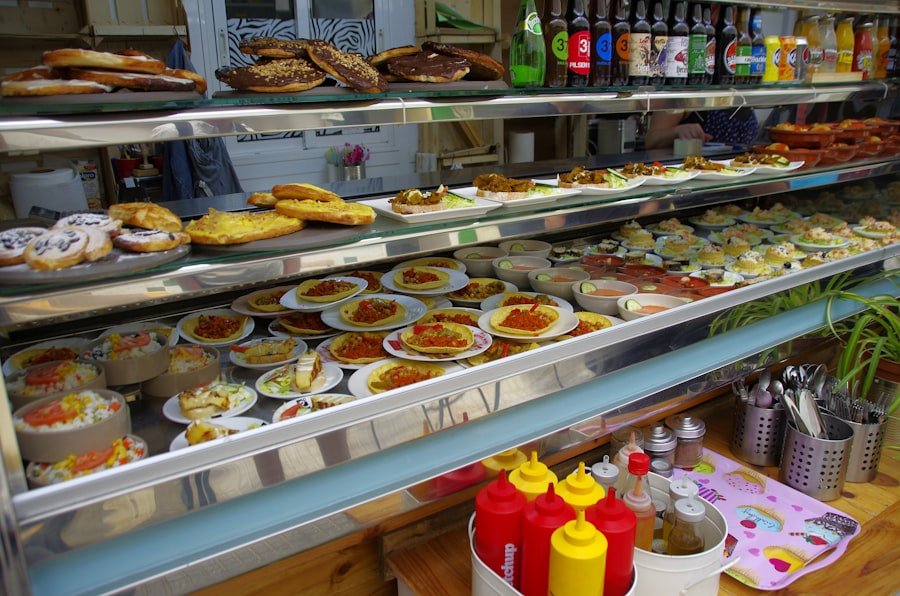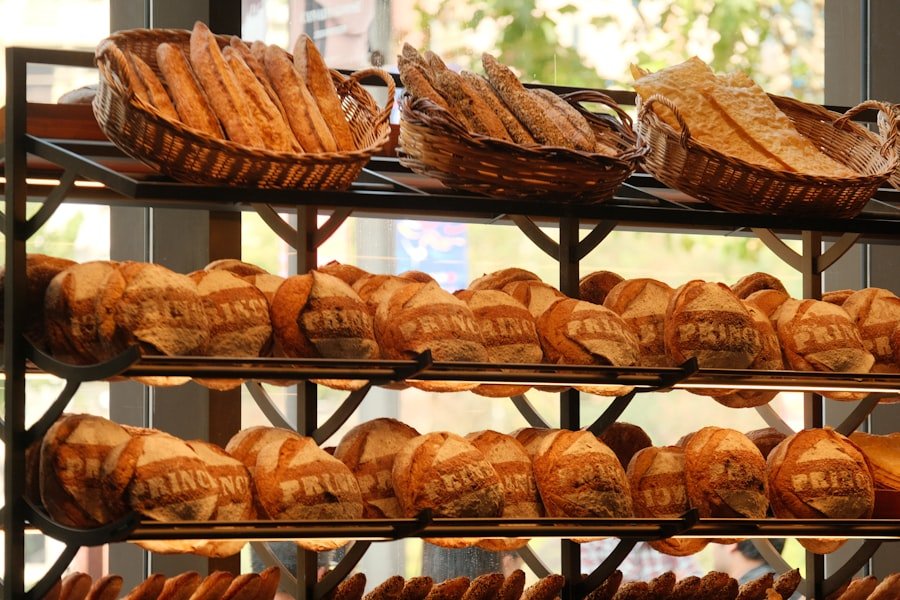The history of bakeries in Galata is a rich tapestry woven into the very fabric of this historic district in Istanbul. Galata, known for its iconic tower and vibrant streets, has long been a melting pot of cultures, and its bakeries reflect this diversity. The origins of baking in this area can be traced back to the Byzantine era, when the neighborhood was a bustling hub for trade and commerce.
As the Ottomans expanded their empire, they brought with them a variety of culinary traditions, including those related to bread-making. This fusion of influences laid the groundwork for the unique baking culture that would flourish in Galata. Throughout the centuries, bakeries in Galata have evolved, adapting to the changing tastes and needs of the local population.
In the 19th century, with the rise of the middle class and increased urbanization, bakeries began to proliferate. They became not just places to buy bread but social hubs where people gathered to share stories and enjoy freshly baked goods. The introduction of new baking techniques and ingredients during this period further diversified the offerings.
By the early 20th century, Galata had established itself as a center for artisanal baking, with many family-owned bakeries passing down their recipes through generations. This legacy continues to shape the bakery scene today.
Key Takeaways
- Bakeries in Galata have a rich history dating back to the Ottoman Empire, with many traditional recipes passed down through generations.
- A wide variety of baked goods are offered in Galata, including bread, pastries, and desserts, each with its own unique flavor and texture.
- Unique flavors and ingredients such as pistachios, rose water, and honey are commonly used in Galata’s baked goods, adding a distinct taste to the treats.
- Bakeries play a significant role in Galata’s culture, serving as community gathering places and preserving culinary traditions.
- Turkish cuisine heavily influences the baked goods in Galata, with flavors and techniques reflecting the country’s diverse culinary heritage.
The Variety of Baked Goods Offered
The variety of baked goods available in Galata is nothing short of astounding. From traditional breads to innovative pastries, each bakery offers a unique selection that caters to both local tastes and international influences. One can find classic Turkish bread varieties such as pide and simit, which are staples in the local diet.
Pide, often referred to as Turkish pizza, is a flatbread topped with various ingredients like minced meat or cheese, while simit is a sesame-crusted bread ring that is perfect for breakfast or a snack. In addition to these traditional offerings, many bakeries in Galata have embraced modern baking trends, resulting in an eclectic mix of pastries and desserts. Croissants filled with local jams, tarts made with seasonal fruits, and decadent cakes are just a few examples of the creativity on display.
Bakeries often experiment with flavors and textures, incorporating local ingredients such as pistachios and hazelnuts into their creations. This blend of tradition and innovation ensures that there is always something new to discover for both locals and visitors alike.
The Unique Flavors and Ingredients

What sets Galata’s bakeries apart is not just the variety of baked goods but also the unique flavors and ingredients that define them. The use of high-quality, locally sourced ingredients is a hallmark of many bakeries in the area. Flour milled from local grains, fresh eggs from nearby farms, and dairy products sourced from regional producers contribute to the exceptional taste of the baked goods.
This commitment to quality is evident in every bite, as the flavors are often more pronounced and authentic than those found in mass-produced alternatives. Moreover, the influence of Turkish cuisine is palpable in the flavor profiles of many baked goods. Spices such as cinnamon, cardamom, and anise are frequently used to enhance both sweet and savory items.
For instance, baklava—a beloved Turkish dessert made from layers of filo pastry filled with nuts and sweetened with syrup—can be found in various forms throughout Galata. Some bakeries offer innovative twists on this classic by incorporating local fruits or unique nut blends. The result is a delightful fusion that pays homage to tradition while inviting experimentation.
The Role of Bakeries in Galata’s Culture
Bakeries in Galata serve as more than just places to purchase food; they are integral to the cultural identity of the neighborhood. These establishments act as communal spaces where people from all walks of life come together to enjoy good food and engage in conversation. The aroma of freshly baked bread wafts through the streets, drawing in passersby and creating an inviting atmosphere that fosters social interaction.
In many ways, bakeries are microcosms of Galata itself—diverse, vibrant, and full of life. Cultural events often revolve around these bakeries, especially during festive seasons or local celebrations. For example, during Ramadan, bakeries play a crucial role by producing special breads and pastries that are enjoyed during iftar—the meal that breaks the fast at sunset.
This not only highlights the importance of baked goods in Turkish culture but also reinforces community bonds as families gather to share meals that feature these beloved treats. The bakery becomes a focal point for cultural exchange, where traditions are celebrated and passed down through generations.
The Influence of Turkish Cuisine on Baked Goods
Turkish cuisine has a profound influence on the baked goods found in Galata’s bakeries. The culinary heritage of Turkey is characterized by its rich flavors and diverse ingredients, which are seamlessly integrated into various baked items. For instance, traditional breads like lavash and yufka are staples that accompany many meals, serving as vehicles for dips or wraps for grilled meats.
These breads are often made using age-old techniques that emphasize hand-kneading and slow fermentation, resulting in textures that are both chewy and flavorful. Additionally, Turkish desserts have made a significant impact on the bakery scene in Galata. Desserts such as künefe—a sweet cheese pastry soaked in syrup—are often featured prominently alongside more conventional pastries.
The use of nuts like pistachios and walnuts is common in many baked goods, adding both texture and richness. The interplay between sweet and savory flavors is a hallmark of Turkish cuisine that is beautifully reflected in the offerings at local bakeries. This culinary synergy not only showcases the versatility of Turkish ingredients but also highlights the creativity of bakers who continue to innovate while honoring their roots.
The Best Bakeries to Visit in Galata

When exploring Galata, several bakeries stand out for their exceptional offerings and unique atmospheres. One such establishment is Karaköy Güllüoğlu, renowned for its baklava that has garnered acclaim both locally and internationally. This family-run bakery has been perfecting its recipes for generations, ensuring that each piece is crafted with care and precision.
Visitors flock here not only for the baklava but also for other traditional sweets that showcase the artistry of Turkish pastry-making. Another must-visit bakery is Mendel’s Bakery, which has gained popularity for its artisanal approach to bread-making. With an emphasis on organic ingredients and traditional techniques, Mendel’s offers a range of sourdough breads that are baked fresh daily.
The inviting atmosphere encourages patrons to linger over a cup of coffee while enjoying a slice of their signature bread topped with locally sourced spreads. Each visit feels like a journey into the heart of Galata’s baking culture, where quality and community intersect.
The Experience of Visiting a Bakery in Galata
Visiting a bakery in Galata is an experience that engages all the senses. As you approach one of these charming establishments, the enticing aroma of freshly baked bread fills the air, beckoning you inside. The sight of golden loaves cooling on racks or pastries glistening with syrup creates an immediate sense of anticipation.
Inside, the warm ambiance is often enhanced by friendly bakers who are eager to share their passion for their craft. The act of choosing baked goods becomes an adventure in itself; each item tells a story rooted in tradition and innovation. Whether you opt for a flaky pastry filled with cheese or a hearty loaf made from ancient grains, each bite offers a glimpse into the culinary heritage of Galata.
Many bakeries also provide seating areas where patrons can enjoy their purchases on-site, fostering a sense of community as people gather to savor their treats together. This communal aspect transforms a simple visit into a memorable experience that resonates long after you leave.
The Future of Bakeries in Galata
As Galata continues to evolve as a cultural hotspot within Istanbul, the future of its bakeries appears promising yet challenging. With increasing competition from modern cafes and international chains, traditional bakeries must find ways to adapt while maintaining their unique identities. Many are embracing sustainability by sourcing ingredients locally and reducing waste through innovative practices.
This shift not only appeals to environmentally conscious consumers but also reinforces connections with local farmers and producers. Moreover, there is a growing trend towards health-conscious baking, with many bakeries experimenting with alternative flours such as spelt or gluten-free options to cater to diverse dietary needs. This evolution reflects broader changes in consumer preferences while still honoring traditional baking methods.
As new generations take over family-run establishments, they bring fresh ideas that blend heritage with contemporary trends, ensuring that Galata’s bakery scene remains vibrant and relevant for years to come. In conclusion, bakeries in Galata are not merely places to buy bread; they are vital components of the neighborhood’s cultural landscape. With their rich history, diverse offerings, unique flavors influenced by Turkish cuisine, and communal role within society, these establishments continue to thrive amidst changing times.
As they navigate future challenges while embracing innovation, they will undoubtedly remain cherished institutions within this historic district.
If you’re looking for a sweet treat to enjoy while exploring the charming neighborhood of Galata, be sure to stop by one of the many bakeries in the area. One related article you may find interesting is this recipe for delicious homemade cottage cheese, which could be a perfect addition to your morning pastry. Whether you’re in the mood for a flaky croissant or a decadent slice of cake, the bakeries in Galata are sure to satisfy your cravings.
FAQs
What types of baked goods can be found in Galata bakeries?
In Galata bakeries, you can find a variety of baked goods such as bread, pastries, cookies, cakes, and traditional Turkish desserts like baklava and künefe.
Are there any gluten-free or vegan options available in Galata bakeries?
Some Galata bakeries may offer gluten-free or vegan options, but it’s best to inquire with the specific bakery for their available options.
Do Galata bakeries offer traditional Turkish baked goods?
Yes, many Galata bakeries offer traditional Turkish baked goods such as simit (sesame-crusted bread rings), börek (savory pastries), and various types of Turkish bread.
What are the typical operating hours for Galata bakeries?
Galata bakeries typically open early in the morning, around 7 or 8 am, and close in the evening, around 7 or 8 pm. However, some bakeries may have extended hours, especially during peak tourist seasons.
Can I find specialty or artisanal bread in Galata bakeries?
Yes, some Galata bakeries may offer specialty or artisanal bread, such as sourdough, whole grain, or seeded loaves. These types of bread are becoming increasingly popular in the area.

